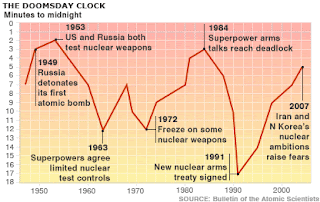
Friday, September 4, 2009
Tuesday, August 18, 2009
a psychohistorian responds
Monday, July 27, 2009
Thursday, July 23, 2009
Thursday, July 9, 2009
Thursday, June 11, 2009
Tuesday, May 5, 2009
Friday, May 1, 2009
Water and Elements
This brings up all sorts of ethical questions. I don't want mind-altering chemicals added to my water! Then again, water itself has been known to alter brain chemistry. So I really don't know what to think.
Objects and the Self
"It’s easy to let oneself off the hook and say, Oh, it’s human nature ... to use objects to define ourselves, but it seems ultimately more fruitful and hopeful to wonder what about our current society invites and provokes this sort of thing, which seems to trap our identities in things to a degree that seems unprecedented."
It got me thinking. To what degree am I defined by my objects? And what does it say about me that I'm typing this rumination on a laptop I pulled out of the trash that runs Windows 98 and turns off if I so much as touch the power cord? *Sigh.*

We are certainly living in a highly materialized time. Perhaps the ubiquity of things necessitates that the current age of object-as-self is unprecedented. But did the medieval peasant not engage in this behavior? Something tells me he would measure his worth (and therein define himself) by the quality of his horse, the sheen of his blade, and the fields he sowed. And before that, the Greeks and the Egyptians. The remnants of their civilizations are self- (or in this case society-)defining objects. Pyramids and columns.
Which brings me back to the ubiquity of things. The heights of manufacturing and technology we've reached allow things to be all the more common. In 2009, we simply have more opportunity to paste ourselves onto objects. In doing so, we run the increasing risk of defining ourselves in impossible terms.

Are there precedents? Where are we headed? Those are questions I leave to the esteemed psychohistorian...
Friday, April 24, 2009
cheezy? yes...
Monday, April 20, 2009
Tuesday, April 7, 2009
i found this poem by jack white
courageous dream's concern
i have driven slow,
three miles an hour or so,
through highland park , heidelberg
cass corridor.
i've hopped on the michigan
and transferred to the woodward,
and heard the good word blaring from an
a.m. radio.
i love the worn-through tracks of trolley
trains breaking through their
concrete vaults,
as i ride the fort street or the baker,
just making my way home.
i sneak through an iron gate, and fish
rock bass out of the strait,
watching the mail boat with
its tugboat gait,
hauling words i'll never know.
the water letter carrier,
bringing prose to lonely sailors,
treading the big lakes with their trailers,
floats in blue green chopping waters,
above long-lost sunken failures,
awaiting exhumation iron whalers,
holding gold we'll never know.
i've slid on belle isle,
and rowed inside of it for miles.
seeing white deer running alongside
while i glide, in a canoe.
i've walked down caniff holding a glass
atlas root beer bottle in my hands
and i've entered closets of coney islands
early in the morning too.
i've taken malt from stroh's and sanders,
felt the black powder of abandoned
embers,
and smelled the sawdust from wood cut
to rehabilitate the fallen edifice.
i've walked to the rhythm of mariachis,
down junctions and back alleys,
breathing fresh-baked fumes of culture
nurtured of the latin and the
middle east.
i've fallen down on public ice,
and skated in my own delight,
and slid again on metal crutches
into trafficked avenues.
three motors moved us forward,
leaving smaller engines to wither,
the aluminum, and torpedo,
monuments to unclaimed dreaming.
foundry's piston tempest captured,
forward pushing workers raptured,
frescoed families strife fractured,
encased by factory's glass ceiling.
detroit
holding off the coward-armies weakling,
always rising from the ashes
not returning to the earth.
i so love your heart that burns
that in your people's body yearns
to perpetuate,
and permeate,
the lonely dream that does encapsulate,
your spirit, that god insulates,
with courageous dream's concern.
three miles an hour or so,
through
cass corridor.
i've hopped on the
and transferred to the woodward,
and heard the good word blaring from an
a.m. radio.
i love the worn-through tracks of trolley
trains breaking through their
concrete vaults,
as i ride the fort street or the baker,
just making my way home.
rock bass out of the strait,
watching the mail boat with
its tugboat gait,
hauling words i'll never know.
the water letter carrier,
bringing prose to lonely sailors,
treading the big lakes with their trailers,
floats in blue green chopping waters,
above long-lost sunken failures,
awaiting exhumation iron whalers,
holding gold we'll never know.
and rowed inside of it for miles.
seeing white deer running alongside
while i glide, in a canoe.
i've walked down caniff holding a glass
atlas root beer bottle in my hands
and i've entered closets of coney islands
early in the morning too.
i've taken malt from stroh's and sanders,
felt the black powder of abandoned
embers,
and smelled the sawdust from wood cut
to rehabilitate the fallen edifice.
i've walked to the rhythm of mariachis,
down junctions and back alleys,
breathing fresh-baked fumes of culture
nurtured of the latin and the
middle east.
i've fallen down on public ice,
and skated in my own delight,
and slid again on metal crutches
into trafficked avenues.
leaving smaller engines to wither,
the aluminum, and torpedo,
monuments to unclaimed dreaming.
foundry's piston tempest captured,
forward pushing workers raptured,
frescoed families strife fractured,
encased by factory's glass ceiling.
holding off the coward-armies weakling,
always rising from the ashes
not returning to the earth.
that in your people's body yearns
to perpetuate,
and permeate,
the lonely dream that does encapsulate,
your spirit, that god insulates,
with courageous dream's concern.
Thursday, March 26, 2009
Responding to Tashbeg's Dictum
I'm all for finding mutual common ground and agree that it is the only way past conflicts; however, the simple perception of common ground can create the very problems we wish to combat. Take the imperialists for example. (Let's assume that they even had a consideration of mutual benefit in their minds - which they most certainly did not.)
Or maybe we should consider small-pox infested blankets. Imperialists think it's good. The natives think it's good too. Both for the same different reasons. "Hey... dirt for blankets is not a bad deal at all!"
On second thought, let's not use the Imperialists as an example. But nevertheless, we know it is possible for people to be so deluded so as to think they're truly helping others when they are not. Oblivious in the face of their detrimental effects. So then: it seems we can't rely on ourselves to do the norm translating. Who will do it then?
Our context is the only one we know. Others know their own. Even within our own limited circles, context can vary greatly. The people living in the apartment above may think it's okay to harvest organs, while those living down the hall only think of playing organs. Across the street the organ meat is sacred, across the ocean, they grind it up for sausage. Behold the sacred sausage! But to all outside observers, we are of the same culture, living in the same environment, much the same context. Commonality is harder to find than I thought. Dubious.
Lest we become mired in the morass of relativism, let us consider the family below:
 They seem like nice people. Sometimes there is just not enough overlap to find common ground. Or maybe the overlapping areas hold no uniting power.
They seem like nice people. Sometimes there is just not enough overlap to find common ground. Or maybe the overlapping areas hold no uniting power. Like you said, to find true understanding we need some form of concentrism - both being born from the same locus. Now, I ask you, how do we find that point?
Like you said, to find true understanding we need some form of concentrism - both being born from the same locus. Now, I ask you, how do we find that point?
Top Albums of 2009
Shoot, I would put Ponytail - Ice Cream Spiritual, but it came out in 2008. Also, Howlin' Wolf. He came out with an album this year, didn't he?
List those you're anticipating here:
Final Fantasy - Heartland
Regina Spektor - Far
Midlake - Courage of Others
Camera Obscura - My Maudlin Career
Kings of Convenience?
Joanna Newsom?
Sufjan Stevens?
Wednesday, March 11, 2009

I am unconvinced that Positivism was or will be the new Right. I believe we are, at all strata, and across time, consistent Positivists; The Dominating West was not the first to think, hey maybe we could figure this thing in the world out… That was a Red Herring upon which too many are still snacking.
Tuesday, March 10, 2009
Saturday, March 7, 2009
Friday, March 6, 2009
A Litter Ation
lost in a reverie.
labor though he must -
languished lackadaisically.
Thursday, February 26, 2009
Chinua Achebe Was Right
Monday, February 23, 2009
Sunday, February 22, 2009
Saturday, February 21, 2009
Friday, February 20, 2009
entendre * x^(n-1)
reaching,
rent his limbs.
While he waited for
the skies to split
asunder.
entendre?
entendre?
Kaplow!
I propose a study of the way doomsdayism affects (or does not) the rise and fall of civilizations. Because, in my estimation, as long as the world has existed, there have been people predicting that it soon will not.
I'm not so much proposing a study of the eschatological theories themselves (though maybe that's necessary to truly get to the heart of the matter), but instead how the cyclic rise and fall of these theories coincides with that of populations around the world. I'm envisioning a time series chart like the following:
 Though our chart will superimpose some sort of population/civilization measure. Is population enough? Moreover, how is eschatological prevalance measured? Is it something arbitrary like the 'Doomsday Clock?' Most likely, we will have to rely on imperfect census measures - extrapolating from them what we will, being careful to avoid the errs of wanton application of causal theory (as the Flying Spaghetti Monster so artfully demonstrated):
Though our chart will superimpose some sort of population/civilization measure. Is population enough? Moreover, how is eschatological prevalance measured? Is it something arbitrary like the 'Doomsday Clock?' Most likely, we will have to rely on imperfect census measures - extrapolating from them what we will, being careful to avoid the errs of wanton application of causal theory (as the Flying Spaghetti Monster so artfully demonstrated): And what of the coarseness of our data set? Regionality will certainly come into play, but then, collapse of one region could have ripple effects that in turn bring down others. In that event, the prominence of a doomsday theory may well extend beyond its reach. The world may then end for those who didn't even know it was supposed to.
And what of the coarseness of our data set? Regionality will certainly come into play, but then, collapse of one region could have ripple effects that in turn bring down others. In that event, the prominence of a doomsday theory may well extend beyond its reach. The world may then end for those who didn't even know it was supposed to.It seems like a relevant study with such topics being all the rage these days - what with economic meltdowns, various climate crises, and the ever-present threat of technological singularity.(1)

